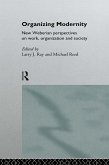Richard Münch begins with an exploration of the points of convergence and divergence in the works of Durkheim and Weber. He then builds, from Durkheim, a new theory of social order as a complex set of ordering, dynamizing, identity-producing and goal-setting factors. Münch also constructs a new theory of personality development, based on Durkheim's view of the duality of human nature. He concludes by assessing weber's contribution to our understanding of how modern social order emerged, showing that the unique features of modern society emerged from the 'interpenetration' of cultural, political, communal and economic spheres in action.
Dieser Download kann aus rechtlichen Gründen nur mit Rechnungsadresse in A, B, BG, CY, CZ, D, DK, EW, E, FIN, F, GR, HR, H, IRL, I, LT, L, LR, M, NL, PL, P, R, S, SLO, SK ausgeliefert werden.









